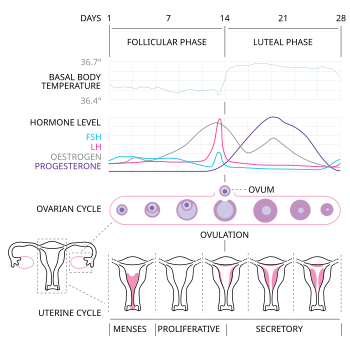
The menstrual cycle is on average 28 days in length. It begins with menses (day 1–7) during the follicular phase (day 1–14), followed by ovulation (day 14) and ending with the luteal phase (day 14–28).[1] Unlike the follicular phase which can vary in length among individuals, the luteal phase is typically fixed at approximately 14 days (i.e. days 14–28)[1] and is characterized by changes to hormone levels, such as an increase in progesterone and estrogen levels, decrease in gonadotropins such as follicle-stimulating hormone (FSH) and luteinizing hormone (LH), changes to the endometrial lining to promote implantation of the fertilized egg, and development of the corpus luteum. In the absence of fertilization by sperm, the corpus luteum degenerates leading to a decrease in progesterone and estrogen, an increase in FSH and LH, and shedding of the endometrial lining (menses) to begin the menstrual cycle again.[1]